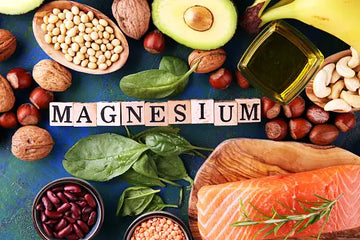

Is Magnesium Good For Women?
Table of Contents
Magnesium is super important for your health, even though you might not hear about it as much as other vitamins and minerals. It's involved in over 300 different things your body does! From keeping your blood pressure in check to helping your bones stay strong, magnesium is a big deal. It also helps out with enzymes and gives you energy.
But here's the thing: lots of women don't get enough magnesium in their diet. And that's a problem because magnesium deficiency can mess with your health in a bunch of ways. So, it's crucial for women to know why magnesium is so great and make sure they're getting enough of it.
In this blog, we'll dive into why magnesium is essential for women's bodies, how it affects women differently, and why it's so good for them.
Is Magnesium Good For Women?
Making sure you get enough magnesium is super important for women's health. It's like a VIP for your body, involved in over 300 different things it does! But sadly, a lot of women aren't getting as much magnesium as they should from their diet, which can lead to some serious health problems.
But here's the good news: boosting your magnesium intake can be a game-changer for your health. Having enough magnesium can lower your chances of high blood pressure, keep your bones strong, and help out your body's enzymes. Plus, because of hormone levels and the higher risk of magnesium deficiency, women can benefit even more from making sure they're getting enough magnesium in their diet.
How Magnesium Affects Women Differently?
Reason No. 1: Reduces Menstrual Pain
One of the reasons why magnesium is good for women is its ability to reduce menstrual pain. Menstrual cramps, also known as dysmenorrhea, can be incredibly painful and disruptive to a woman's daily life. Magnesium supplementation has been shown to help alleviate menstrual cramps and reduce the severity of pain.
Research suggests that magnesium helps relax smooth muscles, including those in the uterus. This relaxation effect can help reduce the intensity of uterine contractions and relieve menstrual cramps. In addition to reducing pain, magnesium supplementation may also help alleviate other symptoms associated with menstruation, such as bloating and mood swings.
Reason No. 2: Improves Sleep Quality
Another reason why magnesium is good for women is its ability to improve sleep quality. Many women struggle with sleep-related issues, such as insomnia or restless sleep. Magnesium supplementation has been shown to help promote better sleep and alleviate sleep disturbances.
Magnesium plays a crucial role in the regulation of neurotransmitters involved in sleep, such as GABA and melatonin. GABA is an inhibitory neurotransmitter that promotes relaxation, while melatonin is a hormone that regulates the sleep-wake cycle. Adequate magnesium levels can enhance the production and function of these sleep-promoting substances, leading to improved sleep quality.
Research suggests that magnesium supplementation can help reduce the time it takes to fall asleep, increase sleep duration, and improve overall sleep efficiency. It can also help alleviate symptoms of insomnia and restless leg syndrome, which are common sleep-related disorders.
While magnesium supplementation can be beneficial for improving sleep quality, it is important to note that individual responses may vary. It is recommended to consult with a healthcare provider before starting any new supplements or making significant changes to sleep routines.
Reason No. 3: Supports Bone Health
Another important reason why magnesium is good for women is its role in supporting bone health. Magnesium works in conjunction with calcium and other minerals to maintain healthy bones and prevent bone loss.
The majority of magnesium in the body is stored in the bones, where it helps maintain the structure and density of the bone. It also influences the activity of bone-building cells called osteoblasts and helps lower inflammation that can damage bone and lead to bone breakdown.
Studies have shown that higher levels of magnesium are associated with greater bone mineral density, especially in postmenopausal women who are at higher risk of osteoporosis. Adequate magnesium intake can help reduce the risk of fractures and improve overall bone health.
According to the National Institutes of Health, most adult women should be getting between 310 and 360 milligrams of magnesium daily to support bone health and maintain optimal mineral density.
Ensuring sufficient magnesium intake, either through dietary sources or supplementation, can play a crucial role in maintaining strong and healthy bones throughout a woman's life.
Reason No. 4: Reduces Inflammation
Reducing inflammation in the body is important for overall health, and magnesium can play a role in this process. Inflammation is a natural response to injury or infection, but chronic inflammation can contribute to the development of various diseases.
Magnesium has been found to have anti-inflammatory properties and can help regulate the body's inflammatory response. It is involved in the production of glutathione, the body's master antioxidant, which helps control inflammation and oxidative stress.
Studies have shown that magnesium supplementation can reduce markers of inflammation, such as C-reactive protein, in individuals with chronic diseases like heart disease, diabetes, and rheumatoid arthritis. By reducing inflammation, magnesium may help lower the risk of developing these chronic conditions.
Maintaining adequate magnesium intake through a balanced diet and, if necessary, supplementation can support the body's natural anti-inflammatory mechanisms and promote overall health.

Recommended Daily Intake of Magnesium for Women
To reap the health benefits of magnesium, it's important for women to ensure they are getting enough of this essential mineral. The recommended daily intake of magnesium for women varies based on age and life stage.
Most adult women should aim for between 310 and 360 milligrams of magnesium daily. However, pregnant and lactating women may have higher magnesium needs, with recommended daily intakes of 350-400 milligrams during pregnancy and 310-360 milligrams while breastfeeding.
It's important to note that individual needs may vary, so it's always best to consult with a healthcare provider to determine the appropriate magnesium intake for your specific circumstances.
Top Magnesium Sources for Women
Getting enough magnesium through a balanced diet is important for women's health. While magnesium can be found in a variety of foods, certain sources are particularly rich in this essential mineral.
Some top food sources of magnesium include:
- Spinach: 78 milligrams per half cup boiled
- Pumpkin seeds: 156 milligrams per ounce
- Almonds: 80 milligrams per ounce
- Chia seeds: 111 milligrams per ounce
- Peanut butter: 49 milligrams per two tablespoons
- Whole grains: Varying amounts depending on the type of grain, but they are generally good sources of magnesium.
Incorporating these foods into your diet can help ensure you are getting enough magnesium to support your overall health and well-being.
Magnesium Supplements
Empower your well-being with Infinite Labs Liposomal Magnesium. This innovative formula delivers highly absorbable magnesium, targeting specific needs of women's health. Whether you crave more energy, seek hormonal balance, or want stronger bones, Infinite Labs Liposomal Magnesium can be your key. Experience the difference - Order yours today!
Let’s Sum Up
The perks of magnesium for women are huge! It can help ease period cramps, keep your bones strong, and even help you sleep better. Making sure you get enough magnesium every day, especially from foods like veggies, nuts, and whole grains, can make a big difference in how you feel overall.
And when you're pregnant or breastfeeding, getting the right amount of magnesium is extra important for staying healthy. Whether you're looking to boost your energy, manage your weight, or just keep your skin and hair looking great, magnesium is your go-to helper. Understanding how magnesium affects women in different ways really drives home how crucial it is for staying healthy and feeling your best.
Frequently Asked Questions
Can magnesium improve skin and hair health in women?
Magnesium plays a vital role in enhancing skin and hair health for women. It aids in collagen production, fights inflammation, and supports healthy hair growth. Incorporating magnesium-rich foods can contribute to glowing skin and luscious hair.
How does magnesium impact sleep quality?
Magnesium aids in improving sleep quality by regulating neurotransmitters that promote relaxation. It enhances melatonin production, helping in falling asleep faster and achieving a deeper, more restful sleep. Adequate magnesium levels contribute to better overall sleep patterns and quality.
Can magnesium help with anxiety and stress management?
Magnesium plays a crucial role in managing anxiety and stress by regulating neurotransmitters. It helps relax muscles, calm the nervous system, and improve mood. Adequate magnesium intake can contribute to better stress management and overall well-being for women.
What is the best time of day for women to take magnesium supplements?
To optimize absorption, women should take magnesium supplements in the evening. This timing aligns with the body's natural rhythms and may enhance sleep quality due to magnesium's calming effects. Avoid taking them with high-fiber foods, as fiber can interfere with absorption.
Are there any specific magnesium forms that are better for women?
Magnesium forms like magnesium citrate and magnesium glycinate are well-absorbed, making them ideal for women. These forms can help with various female health issues such as PMS symptoms, muscle cramps, and stress management.

















